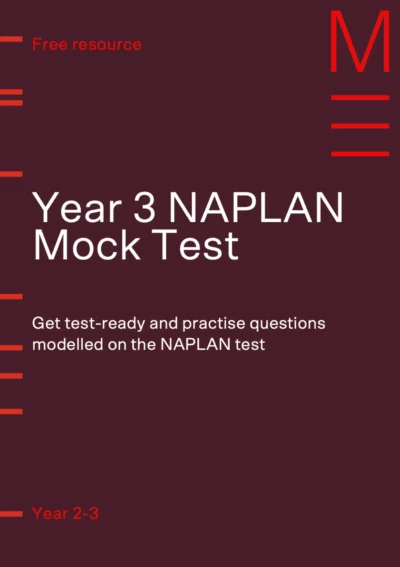Welcome to Matrix Education
To ensure we are showing you the most relevant content, please select your location below.
Select a year to see courses
Learn online or on-campus during the term or school holidays
Learn online or on-campus during the term or school holidays
Learn online or on-campus during the term or school holidays
Learn online or on-campus during the term or school holidays
Learn online or on-campus during the term or school holidays
Learn online or on-campus during the term or school holidays
Learn online or on-campus during the term or school holidays
Get HSC exam ready in just a week
Select a year to see available courses
Science guides to help you get ahead
Science guides to help you get ahead

Before we outline some helpful NAPLAN learning strategies, it is important to first acknowledge that NAPLAN doesn’t require preparation. In fact, ACARA recommends the opposite:
Students are not expected to study for NAPLAN. You can support your child by reassuring them that NAPLAN is a part of their school program and reminding them to simply do their best.
The primary goal of NAPLAN is to inform teaching methods and identify areas that students require special focus. NAPLAN, like all standardised test, is not a measure of your child’s intellect or academic potential. Despite this, the competitive nature of selective schooling programs coupled with confusion surrounding the purpose of NAPLAN has created a culture of high-stakes testing. Perhaps because of this, school surveys and teacher interviews have come to find that an austere commitment to NAPLAN success can be debilitating for young minds.
In one such survey (Primary Principals: Perspectives on NAPLAN Testing & Assessment) sixty-six percent of respondents said that NAPLAN testing had a negative impact on student wellbeing. More specifically, a too-rigorous pursuit of NAPLAN success was linked with a lowered self-esteem, crying, absenteeism, anxiety, apathy, and disengagement. These expressions were commonly found in students who were unable to meet the high standards prescribed to them by their parents, teachers, or peers.
Get test-ready and practice questions modelled on the NAPLAN test. Fill out your details below to get this resource emailed to you. "*" indicates required fields
Free Year 3 NAPLAN Mock Test

Free Year 3 NAPLAN Mock Test

This effect is even more salient among those for whom English is a second language, or who have a learning delay or disability. Ultimately, rigidly pursuing a Band 6 NAPLAN result could come at a cost to your child’s wellbeing, and even discourage them from actualising their true academic potential.
That said, it might still be important to you that your child performs their best in NAPLAN. Whether you are trying to bolster their selective-school prospects, or simply want to boost their literacy, there are ways to prepare. However, as you review our Year 3 NAPLAN study tips below, remember that the above risks are very real. NAPLAN should never be used as a definitive measure of success, and it is important to avoid weaponising it against your child.
As a parent, the best thing you can be doing to support your child’s academic improvement is to show them unconditional love and support. Avoid excessively rewarding good grades, and never disparage bad ones. Instead, always take the time to acknowledge the effort your child is putting into their education, no matter their results. Not only that, but make sure they have plenty of time to play, and have fun!
With that said, let’s go over Matrix’s top preparation steps for ensuring your child is ready for Year 3 NAPLAN.
By simply reading widely and regularly, your child is already studying for NAPLAN. How? Well, the act of reading alone expands vocabulary, enhances reading comprehension, fosters critical thinking, improves writing skills, and builds general knowledge. These key literacy skills are exactly what the first three NAPLAN exams are designed to test. Accordingly, instead of scheduling regular study sessions or hiring a private tutor for your child, try and foster their love of reading instead.
While this step usually starts with a family trip to the book store, we recommend checking out our Ultimate Reading Guide. There, you’ll find some sure-fire tips to make sure your latest literary purchase doesn’t just end up on your child’s floor. Moreover, to find the perfect book for your child, visit Matrix’s List of the Top 10 Books for Year 3 Students!
The Reading, Writing, and Language Convention NAPLAN Exams in Year 3 require a broad vocabulary. To supplement their reading, students are encouraged to regularly expose themselves to new words! In order to expand your child’s vocabulary, consider downloading a free Year 3 Matrix Word List. To make it fun, consider scheduling regular word-based games like Scrabble or Bananagrams with your child.
Whether it’s at the end of a crossword puzzle or a book chapter, make sure your child records every new word they come across. By keeping a written log of unknown words and recording their definitions, your child will become more proactive in expanding their own vocabulary.

When it comes to the Year 3 Writing NAPLAN Exam, there is no better practice than… well, writing! Any kind of writing, whether that be poems, short stories or letters, will benefit your child’s literacy. The most important thing is that your child writes often, and that they enjoy it.
If you are struggling to get your child started, consider using a NAPLAN Writing Prompt, which can be found here, here, and here! These prompts are structured to look exactly like the official questions found in the Year 3 NAPLAN Writing Exam. Accordingly, they make excellent study tools. Once you’ve exhausted these writing prompts, consider downloading Matrix’s free Year 3 NAPLAN Narrative and Persuasive Writing Packs!
Help your child develop strong storytelling skills with this FREE NAPLAN Narrative Writing Guide Fill out your details below to get this resource emailed to you. "*" indicates required fields
Ace the Year 3 NAPLAN Writing section!

Ace the Year 3 NAPLAN Writing section!
While there are many Year 3 NAPLAN worksheets and word lists available, they can be a pricey and unnecessary. For children who are already inundated with schoolwork, these resources can make for an arduous path toward NAPLAN proficiency that fosters resentment rather than passion. Instead, consider the resources your child already has at their disposal. To begin, make sure they are completing all of their set homework, and reading regularly. For most students, this will be more than enough preparation.
For extension tasks, ask your child’s teacher if they have any suggestions. More often than not, educators will have supplementary material to offer, whether that be a homework chapter in the textbook that was skipped, or an in-class task there wasn’t time for. When it comes to the NAPLAN Numeracy Exam, the incomplete sections of your child’s maths textbook is likely the goldmine you’re searching for!
Finally, if you’re ticked off all the steps above, having your child sit a few Past NAPLAN Exam Papers can be a fantastic way of reviewing their NAPLAN readiness. Of course, make sure to reward your child’s effort, and make time in their schedule for plenty of fun breaks. Moreover, if you would like to equip your child with the precise skills needed to ace the NAPLAN Exams, consider enrolling them in a Year 3 NAPLAN Preparation Course.
© Matrix Education and www.matrix.edu.au, 2023. Unauthorised use and/or duplication of this material without express and written permission from this site’s author and/or owner is strictly prohibited. Excerpts and links may be used, provided that full and clear credit is given to Matrix Education and www.matrix.edu.au with appropriate and specific direction to the original content.